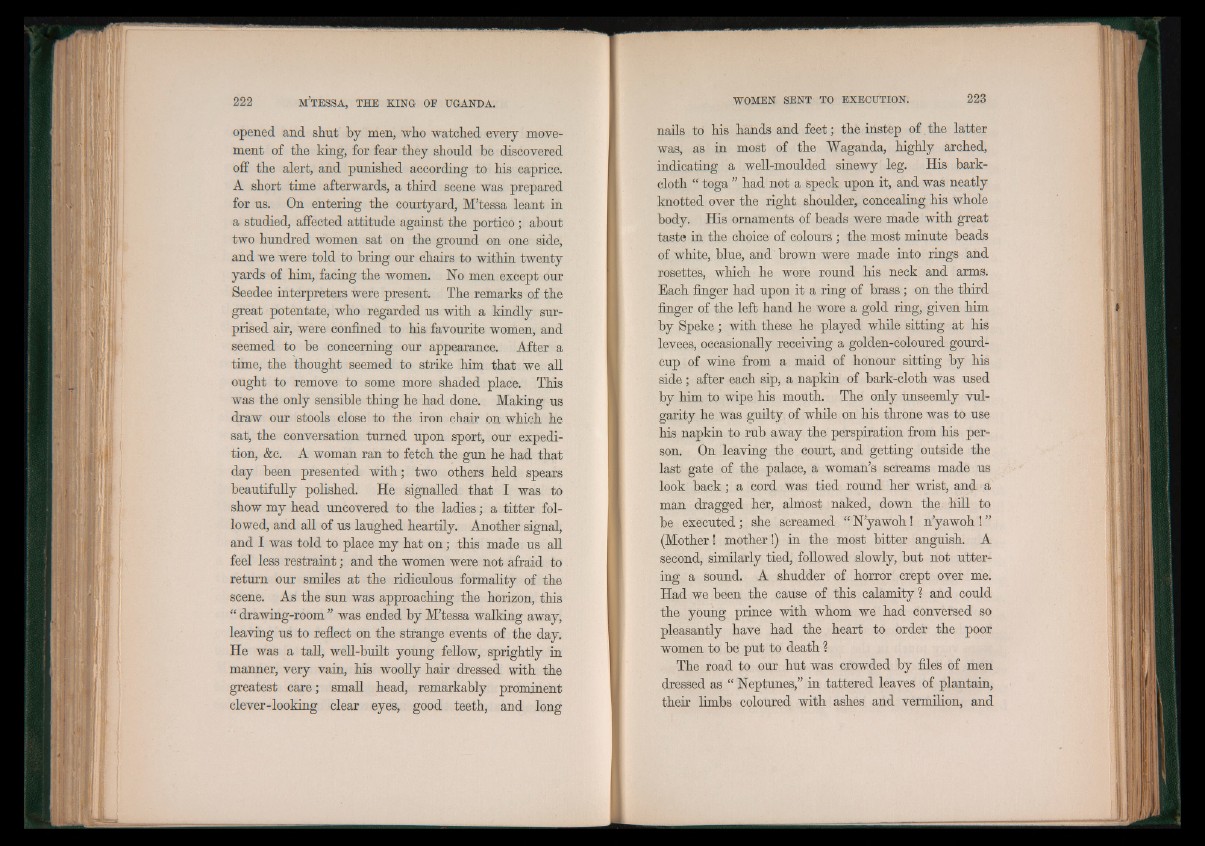
opened and shut by men, who watched every movement
of the king, for fear they should be discovered
off the alert, and punished according to his caprice.
A short time afterwards, a third scene was prepared
for us. On entering the courtyard, M’tessa leant in
a studied, affected attitude against the portico; about
two hundred women sat on the ground on one side,
and we were told to bring our chairs to within twenty
yards of him, facing the women. No men except our
Seedee interpreters were present. The remarks of the
great potentate, who regarded us with a kindly surprised
air, were confined to his favourite women, and
seemed to be concerning our appearance. After a
time, the thought seemed to strike him that we all
ought to remove to some more shaded place. This
was the only sensible thing he had done. Making us
draw our stools close to the iron chair on which he
sat, the conversation turned upon sport, our expedition,
&c. A woman ran to fetch the gun he had that
day been presented with; two others held spears
beautifully polished. He signalled that I was to
show my head uncovered to the ladies; a titter followed,
and all of us laughed heartily. Another signal,
and I was told to place my hat o n ; this made us all
feel less restraint; and the women were not afraid to
return our smiles at the ridiculous formality of the
scene. As the sun was approaching the horizon, th is
“ drawing-room ” was ended by M’tessa walking away,
leaving us to reflect on the strange events of the day.
He was a tall, well-built young fellow, sprightly in
manner, veiy vain, his woolly hair dressed with the
greatest care; small head, remarkably prominent
clever-looking clear eyes, good teeth, and long
nails to his hands and feet; the instep of.the latter
was, as in most of the Waganda, highly arched,
indicating a well-moulded sinewy leg. His bark-
cloth “ toga ” had not a speck upon it, and was neatly
knotted over the right shoulder, concealing his whole
body. His ornaments of beads were made with great
taste in the choice of colours ; the most minute beads
of white, blue, and brown were made into rings and
rosettes, which he wore round his neck and arms.
Each finger had upon it a ring of brass; on the third
finger of the left hand he wore a gold ring, given him
by Speke ; with these he played while sitting at his
levees, occasionally receiving a golden-coloured goura-
cup of wine from a maid of honour sitting by his
side; after each sip, a napkin of bark-cloth was used
by him to wipe his mouth. The only unseemly vulgarity
he was guilty of while on his throne was to use
his napkin to rub away the perspiration from his person.
On leaving the court, and getting outside the
last gate of the palace, a woman’s screams made us
look back; a cord was tied round her wrist, and a
man dragged her, almost naked, down the. hill to
be executed ; she screamed “ N’yawoh! n’yawoh ! ”
(Mother! mother!) in the most bitter anguish. A
second, similarly tied, followed slowly, but not uttering
a sound. A shudder of horror crept over me.
Had we been the cause of this calamity ? and could
the young prince with whom we had conversed so
pleasantly have had the heart to order the poor
women to be put to death ?
The road to our hut was crowded by files of men
dressed as f Neptunes,” in tattered leaves of plantain,
their limbs coloured with ashes and vermilion, and